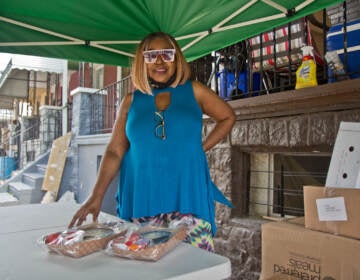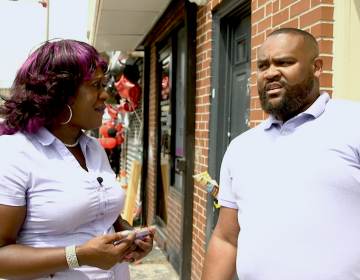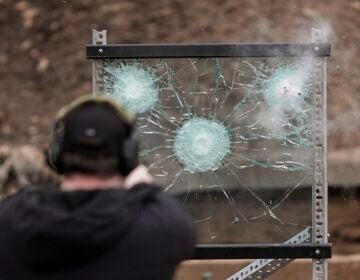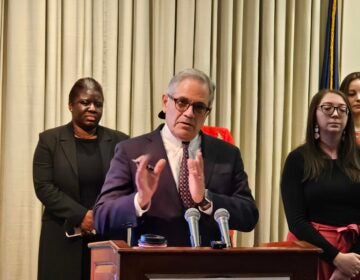Philly mayor doubles down against calls to declare gun violence emergency
Kenney launched his bi-weekly gun violence update by doubling down on his refusal to declare a citywide emergency, arguing it would not help stem the bloodshed.
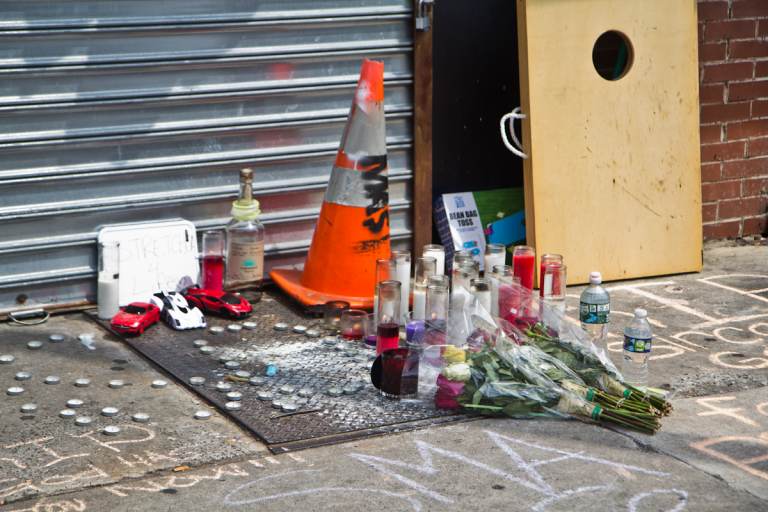
File - A memorial on 60th Street in West Philadelphia remembers those gunned down at a community gathering on July 4, 2021. (Kimberly Paynter/WHYY)
Mayor Jim Kenney launched his bi-weekly gun violence update on Wednesday by saying he won’t declare a gun violence emergency like New York Gov. Andrew Cuomo recently did, arguing that would not have any added benefit for Philadelphia’s fight to curb shootings.
“A local declaration will not unlock new funding. We’ve already done that,” insisted Kenney.
“It will not change the immense inter-agency coordination that is occurring. It will not change the work the Philadelphia Police Department is doing to get illegal firearms and dangerous actors off our streets.”
Still, Kenney admitted the city has not done all it can do as shootings continue unabated.
A Philadelphia Inquirer analysis found on average 10 people have been shot each day in July. About an hour before Wednesday’s briefing, two teens, ages 16 and 18, were killed in a triple shooting in West Philadelphia.
In an effort to do more, Kenney said the city is investing $155 million in after school and mental health programs, workforce development, and other prevention efforts; $27 million of that is new funding.
Kenney declared gun violence a public health crisis two years ago, launching the Roadmap to Safer Communities, which was updated in April. That declaration brought all city agencies together with the goal of reducing gun violence.
According to First Deputy Managing Director Vanessa Garrett Harley, agencies continue to meet on a weekly basis. Some approaches showed promise before the pandemic struck, she said, such as Operation Pinpoint, which was supposed to connect police patrolling crime “hot spots” with shared resources.
“We were beginning to see the shootings and homicides were starting to go down and we believed some of the tactics were really beginning to take hold and then the pandemic hit,” said Garrett Harley.
The city has also launched an injury prevention dashboard and homicide review team that looks at shooting deaths from epidemiological viewpoint to treat gun violence through a public health lens, like the COVID-19 pandemic.
City Councilmember Jamie Gauthier, whose district includes parts of West Philadelphia most affected by shootings, said Kenney is getting hung up on verbiage.
“He can call it whatever he wants,” said Gauthier, adding the city needs to act more urgently, something she’s been calling for for almost a year.
City agencies should be meeting on a daily basis, Gauthier said. She imagines a system where Parks and Recreation can keep facilities open as long as possible in neighborhoods struggling with violence the most. She said the Commerce Department should be able to lay out the number of job programs that are reaching people at most risk of participating in violence.
Under that kind of well-connected response system, Gauthier said the Department of Behavioral Health would be reaching victims’ families with resources the day of a shooting.
Wednesday’s press conference offered a glimpse into the current system of support being offered to victims.
“We respond immediately to work with a family to get their needs met,” said Andrea Brooks with the Department of Behavioral Health.
But “immediate” can vary by family, Brooks went on to say.
Take the case of a 30-year-old woman who was shot in West Philadelphia Tuesday night, on the 5400 block of Pearl Street. In that instance, the city had not reached out to the family as of Wednesday’s briefing. Speaking more broadly, Brooks said sometimes the department will wait until patients become more stable, reaching out to them with trauma support services once they’ve gone home from the hospital.
Gauthier said that’s not good enough.
“We should be there immediately to offer them trauma services,” said Gauthier. “We should be in hospitals. We need to be looking at the hospitals with the highest levels of shootings and putting hospital-based intervention programs in place right now.”
As of Sunday, July 18, more than 1,200 people had been shot in the city, a 21% increase from the same time last year. Last Friday, the city marked 300 homicides, putting the city on pace to exceed last year’s record-breaking number of murders.
For her part, Gauthier said she intends to continue calling for a more robust response to gun violence in the city. On Thursday morning, she and other city and state elected officials will gather in West Philadelphia calling on the city to do more.
WHYY is your source for fact-based, in-depth journalism and information. As a nonprofit organization, we rely on financial support from readers like you. Please give today.


